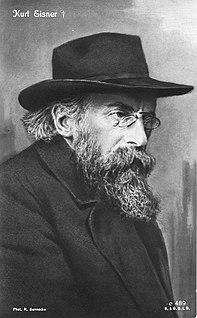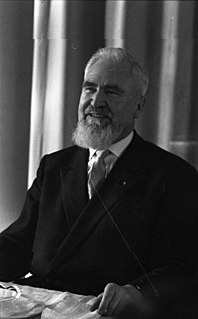The Christian Social Union in Bavaria is a Christian-democratic and conservative political party in Germany. Having a regionalist identity, the CSU operates only in Bavaria while its larger counterpart, the Christian Democratic Union (CDU), operates in the other fifteen states of Germany. It differs from the CDU by being somewhat more conservative in social matters, following Catholic social teaching. The CSU is considered the de facto successor of the Weimar-era Catholic Bavarian People's Party.

The House of Wittelsbach is a German dynasty, with branches that have ruled over territories including Bavaria, the Palatinate, Holland and Zeeland, Sweden, Hungary, Bohemia, the Electorate of Cologne and other prince-bishoprics, and Greece. Their ancestral lands of the Palatinate and Bavaria were Prince-electorates, and the family had three of its members elected emperors and kings of the Holy Roman Empire. They ruled over the Kingdom of Bavaria which was created in 1805 and continued to exist until 1918.

Kurt Eisner was a German politician, revolutionary, journalist, and theatre critic. As a socialist journalist, he organized the Socialist Revolution that overthrew the Wittelsbach monarchy in Bavaria in November 1918, which led to his being described as "the symbol of the Bavarian revolution". He is used as an example of charismatic authority by Max Weber. Eisner subsequently proclaimed the People's State of Bavaria but was assassinated by far-right German nationalist Anton Graf von Arco auf Valley in Munich on 21 February 1919.

The Bavarian People's Party was the Bavarian branch of the Centre Party, a lay Roman Catholic party, which broke off from the rest of the party in 1918 to pursue a more conservative and more Bavarian particularist course.

Horst Lorenz Seehofer is a German politician who served as Minister of the Interior, Building and Community under Chancellor Angela Merkel from 2018 to 2021. A member of the Christian Social Union (CSU), he served as the 18th Minister President of Bavaria from 2008 to 2018 and Leader of the Christian Social Union in Bavaria from 2008 to 2019.

Thomas Dehler was a German politician. He was the Federal Republic of Germany's first Minister of Justice (1949–1953) and chairman of Free Democratic Party (1954–1957).

Fritz Schäffer was a German politician of the Bavarian People's Party (BVP) and the Christian Social Union (CSU). He was the Bavarian Minister of Finance from 1931 to 1933, when the Nazis came to power in Berlin. In 1945 he became the first Minister President of Bavaria to hold office after the end of the Second World War. From 1949 to 1957, he was the West German federal Minister of Finance and, from 1957 to 1961, federal Minister of Justice.
CDU/CSU, unofficially the Union parties or the Union, is a centre-right Christian-democratic political alliance of two political parties in Germany: the Christian Democratic Union of Germany (CDU) and the Christian Social Union in Bavaria (CSU).
Maria Probst was a German politician of the Christian Social Union of Bavaria.
Willi Ankermüller was a German politician and jurist. He represented the Christian Social Union of Bavaria (CSU), and was a member of the Landtag of Bavaria in the 1950s.
Anton von Aretin was a German politician, representative of the Bavaria Party and the Christian Social Union of Bavaria (CSU). He was also a member of the Landtag of Bavaria.
Walter Becher was a German Bohemian politician, representative of the All-German Bloc/League of Expellees and Deprived of Rights (GB/BHE), All German Party (GDP) and the Christian Social Union of Bavaria.
Stefan Dittrich was a German politician, who represented Deggendorf for the Christian Social Union of Bavaria. in the Bundestag.
Conrad Warmund Christian Maria Fink was a German librarian and politician who represented the Bavaria Party and the Christian Social Union of Bavaria. He was district administrator for Pfarrkirchen and from 1949 to 1953 a Member of the Deutscher Bundestag.
Joseph-Ernst Graf Fugger von Glött , since 1940: Fürst Fugger von Glött was a German politician and representative of the Christian Social Union of Bavaria. He was a member of the Bundestag of Germany between 1949 and 1953. From 1954 to 1962 he was a member of the Landtag of Bavaria. He is a member of the famed Fugger family, the preeminent bankers of the renaissance era.
Friedrich Jakob Funk was a German Politician of the Christian Social Union (CSU).

Alois Hundhammer was one of the most prominent politicians in Bavaria after World War II.

The People's State of Bavaria was a short-lived socialist state in Bavaria from 1918 to 1919. The People's State of Bavaria was established on 8 November 1918 during the German Revolution, as an attempt at a socialist state to replace the Kingdom of Bavaria. The state was led by Kurt Eisner until his assassination in February 1919, and co-existed with the rival Bavarian Soviet Republic from 6 April 1919, with its government under Johannes Hoffmann exiled in Bamberg. The People's State of Bavaria was dissolved upon the establishment of the Free State of Bavaria on 14 August 1919.

The Würzburg Soviet Republic was an unrecognized, short-lived state organized under council communism in Würzburg, Germany in April 1919 and consisting of the Bavarian district of Lower Franconia. It was established near the end of the revolutionary turmoil that followed the defeat of the German Empire in World War I.
Michael Horlacher was a German politician and member of the Bavarian People's Party and later Christian Social Union in Bavaria. After Second World War and the establishment of West Germany he Served as president of the Landtag of Bavaria.







